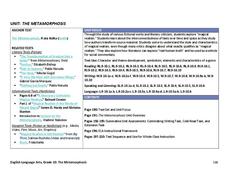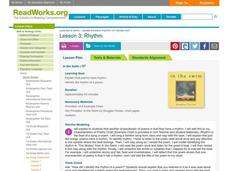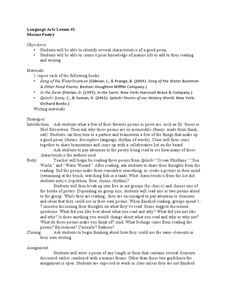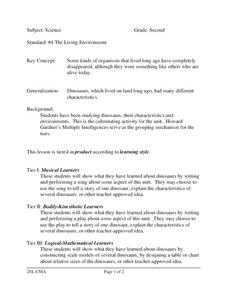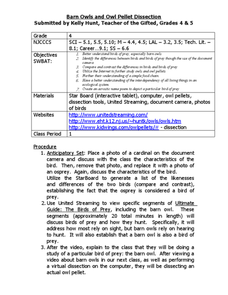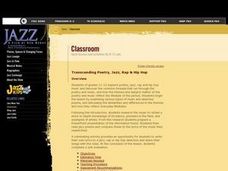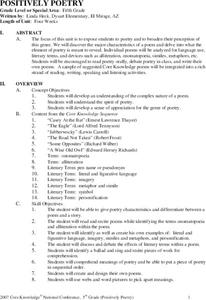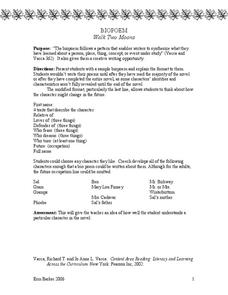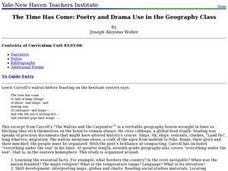Curated OER
Write Your Own Haiku
Use this resource as a quick and easy way to discuss the characteristics of haikus. Learners identify the number of syllables required for each line, and talk about the subject matter. The one thing missing from this presentation is an...
Curated OER
Rhythm & Improv: Jazz & Poetry
Students analyze the elements of poetry and jazz. For this critical thinking skills lesson, students take a closer look at the rhyme, rhythm, alliteration, form, free verse, lyricism, and imagery that exist is jazz as well as poetry.
Louisiana Department of Education
The Metamorphosis
How can something be true even if it didn't happen? Invite your classes to investigate the truths found in the world of magical realism as they analyze short stories, poems, informational texts, video, and art from this genre.
Curated OER
Rhythm
One of the most fun characteristics of a poem is rhythm! Little ones will clap along as you read a poem, to determine the rhythm of the piece. The book In the Swim is used throughout the lesson; it contains fish themed poems that kids...
Curated OER
Letters to Poets
Add a strong poetry lesson to your literature unit. Middle and high schoolers investigate their writing voices with journaling and group discussion, then choose a famous poet to study. They write letters to their chosen poets, explaining...
Curated OER
Marine Poetry
Young scholars identify characteristics of good poetry and compose their own. In this marine poetry lesson, students are introduced to several different types of poetry with a marine theme. After discussing the elements that make up a...
Curated OER
Poetry Portraits
Students consider the attributes of heroes. For this literature lesson, students read selected poems from Hesse's Out of the Dust and then create their own bio-poems that feature themselves as heroes.
Curated OER
Out of the Dust: Open Form Poetry
Learners write a description of their own life in the same style used in the first poem in Out of the Dust. For this Out of the Dust lesson, students discuss open form poetry and how the spacing and line breaks create a flow to the poem...
Curated OER
Edward Lear, Limericks, and Nonsense: There Once Was...
Students recognize poetic devices including rhyme, syllabification, and meter. They identify the characteristics of a nonsense poem and of a limerick. They write their own limericks.
Curated OER
The Living Environment
In this reading comprehension lesson, 2nd graders have the choice between musical, kinesthetic, logical mathematical and verbal linguistic options to display their knowledge. Students can write a song, perform a play, construct a model...
Curated OER
Barn Owls and Owl Pellet Dissection
Students explore birds of prey and food chains. In this ecosystems and birds of prey cross curriculum science and literacy lesson, students brainstorm characteristics of birds after viewing photographs. Students view a video and document...
Curated OER
Edward Lear, Limericks, and Nonsense: There Once Was?
Students explore limericks. In this poetry writing lesson, students listen to and read a variety of poems written by Edward Lear. Students count syllables and identify meter by clapping as they read aloud. Students complete a limerick...
Curated OER
Bio-Poems and U.S. History
Students explore U.S. History by writing poems. In this United States leader biography lesson plan, students identify elements needed to create a good poem, and write a Bio-Poem about themselves. Students utilize the same form to write a...
Curated OER
Personalized Poetry Portfolio
Eighth graders create their own poetry portfolio containing poems that relate to Students' lives and families. The portfolio consist of the following types of poems: acrostic, diamante`, haiku, cinquain, and free verse.
Curated OER
Poetry through Jazz, Rap, and Hip Hop
Young scholars explore poetry through jazz, rap, and hip hop music. They discover the common threads that run through the poetry and music. Students design their own lyrics to a jazz, rap, or hip hop selection and share their songs...
Curated OER
Beowulf
Young scholars read the epic, Beowulf and examine the nature of good and evil. They compile a list of questions about loyalty tests and take turns asking and answering them. they create Beowulf comic strips and research other epic tales.
Curated OER
Do You Haiku?
After examining several Haiku and noting characteristics of the form, class members create five of their own poems. Use this resource for extra practice or review.
Curated OER
Positively Poetry
Students complete a unit on poetry. In this poetry lesson, students complete 19 lessons that focus on reading and writing poetry as well as learning about literary elements and sound devices. Students read poetry orally, debate poetry in...
Curated OER
Friendly Patter Poetry
Pupils create a free from poem on the topic of friendship. They read examples of free form poetry to gather ideas. Through the use of a graphic organizer, students generate a list of friendship characteristics which is used to create a...
Gottlieb
Kennings vs. Stock Epithets – A Quick Review
Bone-crusher. Troll-wife. Battle-sweat. Blood-worm. What study of Beowulf would be complete without offering readers of this Old English epic poem an opportunity to craft their own kennings and epithets? Provide individuals with a copy...
Novelinks
Walk Two Moons: Biopoem
Middle schoolers describe the characters of Walk Two Moons as they write biopoems. Following the pattern provided, young writers depict their chosen characters' traits and experiences to make their poems unique.
Curated OER
Be the Poet
Middle schoolers work through a Haiku Organizer to determine the characteristics they use to write eight haiku poems on a theme that they choose. They design presentation folders of their completed work.
Curated OER
Emily Dickinson Poetry
Students identify a poem by Emily Dickinson for analysis. They apply a set of critical questions to a poem in order to interpret poem and find literary elements used by author. They organize information for a PowerPoint presentation...
Curated OER
The Time Has Come: Poetry and Drama Use in the Geography Class
Students use drama and poetry in their Geography class. In groups, they role play an interviewer or the interviewee in various plays that were presented to them. In their role, they must locate and label where the countries mentioned...




